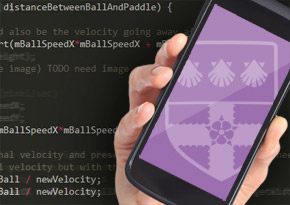Reading opens up computer programming to thousands of students globally – for free
Release Date 18 September 2013

Update 19 September 2013: We are delighted by the huge response to our first ever free online course. Unfortunately we have now filled all the places for the course starting on 28 October 2013. We plan to run the course again from early in 2014 - please do register your interest on the FutureLearn website and we will back in touch.
Thousands of students from around the world will learn to program a mobile computer game thanks to one of the first ever free online short-course offered by a UK university.
The University of Reading's Begin Programming: Building Your First Mobile Game course will go live on 28 October - part of the first wave of high quality Massive Open Online Courses (MOOCs) from 21 top UK universities over the coming months - all offered on the new FutureLearn website launched today and owned by the Open University.
The seven-week course teaches the basics of Java programming to develop a simple computer game from scratch that can run on computer, Android phone or tablet - writing code, creating algorithms to solve problems and taking the first steps with the key tools used by the IT industry worldwide.
It is designed to be a first step or taster for undergraduate computer programme courses; to equip students for studies in maths, science or engineering courses; or as a beginner's course for adult learners interested in getting to grips with basic programming.
The course, developed by experts at the University's internationally renowned School of Systems Engineering, is available on the FutureLearn website and will be accessible from smart phones, tablets and desktop computers. It will combine video introductions, on-screen examples, articles and discussions to explain the principles behind computer programmes and the building blocks to create them.
University staff will support students throughout the course - with a thriving online forum so people can learn actively through discussion-threads based on the learning material.
Sir David Bell, University of Reading Vice-Chancellor, said: "Programming is everywhere - from dishwashers to space shuttles. It's ridiculous in the 21st century that computer science still has a geeky reputation. The fact is that it underpins the entire world around us and the IT industry is one of the UK's biggest business success stories.
"People intuitively understand how laptops, computers and mobile technology work but everyone should understand the basic programming behind these devices. This course will teach the key concepts and skills - using logic to solve problems, writing algorithms and creating code. It will equip people of all ages with the essentials and, who knows, spark an enthusiasm that might lead to degree-level study. The course will be of as much interest to school students and undergraduates who want to enhance their knowledge, as it will be to others who are looking to reskill or pursue a new interest.
"Offering free taster courses online is a no-brainer. Universities shouldn't be afraid to open up teaching and research, either in the UK or beyond. Learning never stops and as the economy's demand for higher skills rises, universities should be in the vanguard when it comes to providing new opportunities. Making courses accessible online, on mobiles and tablets means that people can fit their studying around their lives, rather than their lives around study."
Simon Nelson, CEO of FutureLearn said: "We wanted to make FutureLearn a fresh, different and enjoyable user experience. We have designed the website in line with principles of effective learning, such as storytelling, discussions and celebrating progress. We decided to go live with FutureLearn now, in an open testing phase, so that we can remain responsive to learners as we continue to develop the website."
The FutureLearn website will run as an open beta until early 2014. Learners will be able to sign up for a selection of courses from FutureLearn's university partners, with learner feedback used to inform the ongoing development of the website. Learners from over 165 countries have registered their interest in taking a course on FutureLearn.
ENDS
Notes to editors:
1. The University of Reading is a global University ranked in the top 1% of universities world-wide (THE World University Rankings 2012). The University of Reading is one of the UK's top research-intensive universities - with an established international reputation in meteorology and climate change; real estate and planning; construction management; agriculture; system engineering; archaeology; philosophy; food biosciences; law; typography and graphic design.
Follow @UniofReading on Twitter >>>
2. FutureLearn is the first UK-led multi-institutional provider of free, open, online higher education courses. It will offer courses for people to access and enjoy wherever they are in the world on multiple devices. Courses will be created by the Universities of Bath, Birmingham, Bristol, Cardiff, East Anglia, Edinburgh, Exeter, Glasgow, Leicester, Loughborough, Kings College London, Lancaster, Leeds, Monash, Nottingham, The Open University, Queen's Belfast, Reading, Sheffield, Southampton, Strathclyde, Trinity College Dublin and Warwick. In addition, the British Council, British Library and the British Museum have all agreed to partner with FutureLearn to share content and their expertise and collaborate in the development of courses through FutureLearn.com.